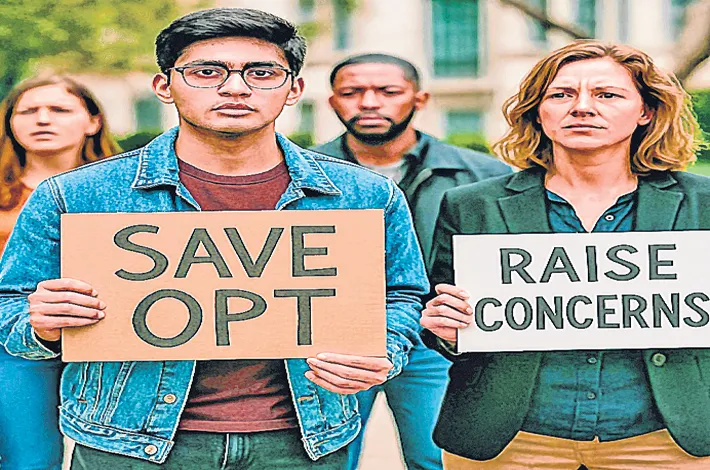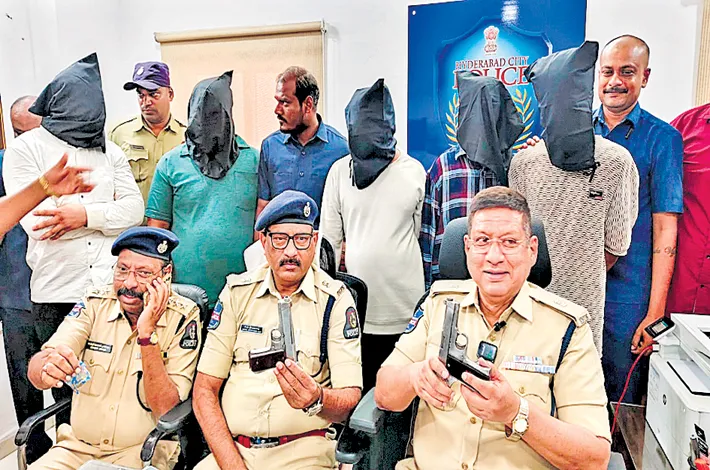Greedy businesses replace Americans with cheap labour
16-04-2025 12:00:00 AM

US bill proposes to scrap post-study work permit-OPT, intl students panic
However, the bill clarifies that F-1 students would still be allowed to work while enrolled in school. It specifically targets the extension that allows students to stay and work in the U.S. for up to three years post-graduation, especially in STEM-designated fields. One of the key reasons students choose the US is just to get as much time with Optional Practical Training
A bill seeking to terminate the Optional Practical Training (OPT) program, which allows international students in the United States to work temporarily after graduation, has sparked concern among students and education leaders.
Introduced in the US House of Representatives on March 25, 2025, by Arizona Republican Congressman Paul Gosar, the Fairness for High-Skilled Americans Act, seeks to abolish the post-completion OPT program. Gosar argues that the program gives businesses tax incentives to hire foreign workers, thereby undercutting American graduates.
“The OPT program incentivizes greedy businesses to fire Americans and replace them with inexpensive foreign labour,” Gosar said in a press statement. He further claimed that foreign hires under OPT avoid payroll taxes under the Federal Insurance Contributions Act (FICA) and Medicare.
However, the bill clarifies that F-1 students would still be allowed to work while enrolled in school. It specifically targets the extension that allows students to stay and work in the U.S. for up to three years post-graduation, especially in STEM-designated fields.
Education leaders warn that ending the OPT program could severely impact the U.S. higher education sector.
Terrence Graham, associate dean for graduate education and chief international officer at the USC Mann School of Pharmacy, in a previous interaction, said, "I think it's important for US higher education to keep inviting students from around the world." "One of the key reasons students choose the U.S. is just to get as much time with OPT," stated Graham. The majority of our programs at my institution are STEM-designated, he notes, enabling overseas students to work in the United States for up to three years following graduation.
"The discussion about this issue in the incoming administration is alarming, particularly with some anti-immigrant factions," Graham tells FPJ. Entrepreneurs like Elon Musk, who see the value of overseas students to the American economy, are also strongly supporting the initiative. These skilled individuals are essential to the Bay Area, and I have faith that the business community's backing will surpass any resistance.
Students, too, are wary of the bill’s implications. “There’s less than a 1% chance of this bill getting passed,” said Mitesh Singh, a student at Boston University. “Universities make so much money through master’s and OPT programs—there’s no way they’ll eliminate it soon.”
Singh also spoke about the growing difficulty in finding H1B visa sponsors. “Since the Trump administration, there’s been a lot of uncertainty. Sponsoring H1B workers is expensive; it involves legal and registration fees. So many employers are now preferring U.S. citizens.”
Prospective students like Aayushi Chowdhary are also reconsidering their plans. “The OPT scheme is important because it offers valuable work experience,” said the computer science applicant. “Yes, there are concerns about misuse, but prohibition would discourage students like me from choosing the U.S. altogether.”
Though the bill mirrors a similar 2019 attempt that failed, its reintroduction reflects renewed political interest in immigration-related reforms ahead of the presidential elections.
What is OPT Training?
International students in the US on F-1 visas may work for 12 months in a work associated with their area of study in the OPT program. The OPT may be either a "post-completion OPT," which allows work after graduation, or a "pre-completion OPT," which is before the student completes his/her studies.
International students must be enrolled full-time in a course of study in the US for a minimum of one academic year in order to qualify for the pre-completion OPT. STEM students qualify to have their OPTs extended by a further 24 months. This basically means into a STEM student being able to work in the US for three years after graduation.








